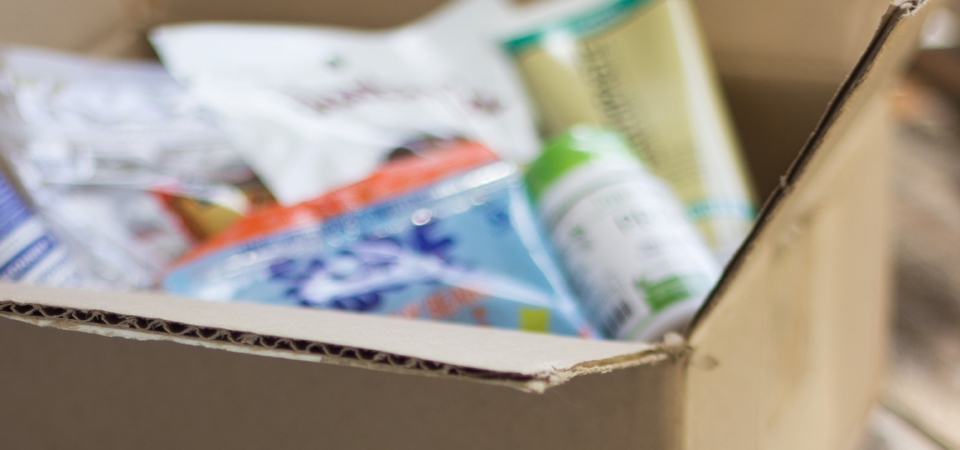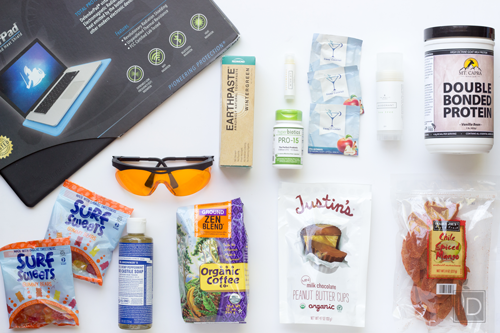One of the first things I do after my husband deploys (besides wallow in self-pity for a little while of course) is start planning out my first care package. Curating all the different things I will send to him helps me feel a little closer to him even when he’s thousands of miles away. And, I like to think that when he opens the package and sees all the things I’ve lovingly compiled for him, he feels a little closer to me as well.
Now, this isn’t a post about how to send really awesome and creative themed care packages to your spouse. That really isn’t my thing, although I totally admire those people who excel at that and I kind of wish I were one of them. This also isn’t a post about how to send a super lovey-dovey, romantic care package that your spouse will treasure for the duration of deployment and beyond. That also isn’t my thing.
What is my thing? My thing is health. And practicality. When it comes to sending care packages to my husband when he’s overseas, I like to send him practical things he will use that will help build his health. Deployments do not promote a healthy lifestyle. Deployments are full of sleepless nights, tons of stress, MREs, and very little time off. The last thing I want to do is send him a box full of things that are only going to exacerbate the issues associated with stress, lack of sleep, and a poor diet. Instead, I send him healthy food, specific nutrients to help him deal with deployment related issues, products he needs that won’t add to his toxic load, and a few small sentimental things to remind him of home.
Healthy snacks and other food options
- Paleo Kits from Steve’s Paleo Goods: These are basically a combination of jerky, nuts and seeds, and dried fruit. Their jerky is super clean and contains no gluten, soy, MSG or added sugar, and there is even a grass fed option. My husband loves to use these out in the field in place of MREs because they are super portable and high in protein. They even have a “Paleo MRE” kit that has over 1000 calories for those times when all they have time for is one quick meal. They offer a 10% discount for military, so make sure you email them about that!
- Bubba’s Snack Mix: If your spouse enjoys pub mix, Chex mix and other snacks of that sort like mine does, they will probably love this healthier, real food take. I sent my husband the original, ranch, and chipotle honey BBQ flavors to serve as a little snack to break up the monotony of DFAC food and MREs.
- Epic Bars: Epic Bars are another product that can be used as a snack or meal replacement out in the field because they are portable and don’t require refrigeration. They are sort of like beef jerky but with a softer texture and in bar form. They use grass fed, sustainable meats in their bars, along with dried fruits and spices, so they make a really delicious snack when there isn’t another healthy option.
- Trail Mix: My husband loves to munch on trail mix, and while there are plenty of unhealthy trail mixes out there, there are also plenty of healthy ones. The best options are trail mixes without any vegetable oils or added sugar, just nuts, seeds, dried fruit, and some salt or other seasoning. I like this homemade trail mix from Against All Grain, but I’d leave out the chocolate chips since they tend to melt in the mail or in rucksacks out in the field.
- Homemade baked goods: Things like homemade cookies and brownies can be fun additions if you like to bake because it’s nice to feel like you’re making something for your spouse. If you’re going to send them some homemade treats, opt for healthier ones using whole food ingredients instead of your typical white flour, refined sugar, and vegetable oils. I love these macaroons, these chocolate chip cookies, these muffins, and these brownies.
- Coffee: I don’t know how it is in the other branches of the military, but I know the army typically serves some pretty crappy coffee. If your spouse has a way to brew their own coffee, send them a bag of ground beans that won’t taste like dirt. Bonus points if it’s from their favorite local coffee shop! I like to buy organic and fair trade coffee like the one pictured above, or this one or this one. If you need an instant coffee option these single serving organic coffee packets are super convenient.
- Sweet treats: Let’s be honest, while sugary treats are not the best option for our health, they can be comforting for the soul. And when do you need comfort more than during a deployment? So I’m not against sending your spouse the occasional sweet treat. Dried fruit makes a good real food alternative to candy (I love the chile spiced mango from Trader Joe’s). Gummy bears are my husband’s favorite candy so I’ll sometimes send him the gummy bears from Yum Earth Organics or Surf Sweets. If your spouse is more of a chocolate fan, the peanut butter cups from Justin’s or coconut butter cups from Eating Evolved are a great option, but keep in mind again that chocolate does sometimes melt.
Supplements
- Protein powder: Protein powder is a nice thing to have on hand because it’s portable and can easily be mixed with water for a quick protein boost when there isn’t time to eat. Also, I know working out regularly can be pretty common on deployments where they have access to that sort of thing so it can act as a great recovery post workout. The problem is most protein powders contain protein that isn’t very bioavailable and comes from conventionally raised cows or soy-based sources, along with added sugar and other artificial ingredients. My favorite protein powders are the Double Bonded Protein from Mt. Capra (a mixture of whey and casein protein from goat’s milk), whey protein from SFH (grass fed cow’s milk), and collagen from Vital Proteins for a non-dairy based option.
- Sleep support: Sleep is often sorely lacking during deployments so it’s important that when there is the opportunity to sleep, that sleep is high quality, deep sleep. Sleep can be impaired for a number of reasons, stress and unbalanced circadian rhythms being two big ones. There are a number of options to address these issues and help improve sleep quality. Magnesium is great because it works to help relax the muscles and reduce stress, which can help when there are problems sleeping. ZMA, which contains zinc, magnesium, and vitamin B6, is used by athletes for recovery but has also been found to be supportive of sleep. Herbs like valerian, passionflower, chamomile, hops, and kava kava root can also help to induce sleep. My favorite herbal teas are Nighty Night Tea from Traditional Medicinals and the sleep tea from Lake Missoula Tea Company. Shift work and staying up past sunset on the computer and other devices with LED screens, both of which are prevalent on a deployment, can upset circadian rhythms. Wearing amber tinted glasses that block the blue and green hue light waves once the sun sets can help reset circadian rhythms which can help improve sleep. If your spouse has a really hard time getting good sleep and none of these other options have helped, a more potent sleep aid, like this Sleep Cocktail which contains GABA, tryptophan, melatonin, and 5-HTP, may be beneficial.
- General wellness supplements: Because the diet is often so poor during a deployment, additional support for general wellness may be helpful. Pure, sustainably sourced fish oil or fermented cod liver oil for omega-3 fatty acids, probiotics to help balance the gut microbiome, and a high quality multivitamin are all supportive of general health.
Personal Hygiene
- Deodorant: I don’t think I need to point out why this is necessary. Opt for more natural deodorant that doesn’t contain aluminum or other hormone disrupting ingredients like this one (I like tea tree or lemongrass if you’re purchasing for a man) or this one.
- Lip balm: My hubby likes the creamsicle and peppermint scented lip balm from Primally Pure or the Fat Stick from Fatco, which is handy for when it’s not just your lips that need some balm.
- Toothpaste: My favorite natural alternatives for toothpaste are the Thieves toothpaste from Young Living, Earthpaste, or homemade tooth powder.
- Hand sanitizer: Hand sanitizer is always handy, especially when you haven’t been able to shower for a while. At least your hands can be clean! While traditional hand sanitizer contains toxic triclosan, there are natural, non-toxic versions on the market. My favorites are the Thieves hand purifier from Young Living and the hand sanitizing spray from Dr. Bronner’s.
- Soap: Again, no need to tell you why this is a helpful addition to a care package. I use Dr. Bronner’s for all my soap needs.
Other
- DefenderPad: Laptops and other electronic devices give off EMF’s which have been linked to decreased sperm count and compromised fertility, among other things. Since that’s not something I’d like to have happen to my husband, I’m sending him a DefenderPad that he can put on his lap when he uses his laptop, kindle, etc. to protect his sperm. Post-deployment baby making is sort of a thing so we’ve got to protect those reproductive organs during the deployment!
- Underwear: Because everyone could use a few extra pairs of underwear.
- Pictures from home: Here’s where I get a tad bit more sentimental than practical. Having pictures of the family, pets, favorite places around home, etc. can be a helpful thing to display at their desks or bedsides when deployed. And I know it makes me feel better to know that my husband has a picture of me and our pups to look at when he misses us. I got my husband this engraved metal photo card to keep in his wallet before he left.
- Handwritten note from you: Last but not least, I like to include a little handwritten note from me. Sometimes it’s short and sweet, sometimes it’s long and super sappy. Either way there is something nice about a handwritten note. It just seems more personal. If you have kids, you could include notes or drawings from them as well to send in your care package.
So that’s all the ideas I’ve got for you today. Ask me in another six months when this deployment is over though and I may have a few more. Now I’m off to the post office to send my care package to my hubs.
Tell me, what are your favorite healthy, natural options to send to your spouse when they are deployed?


